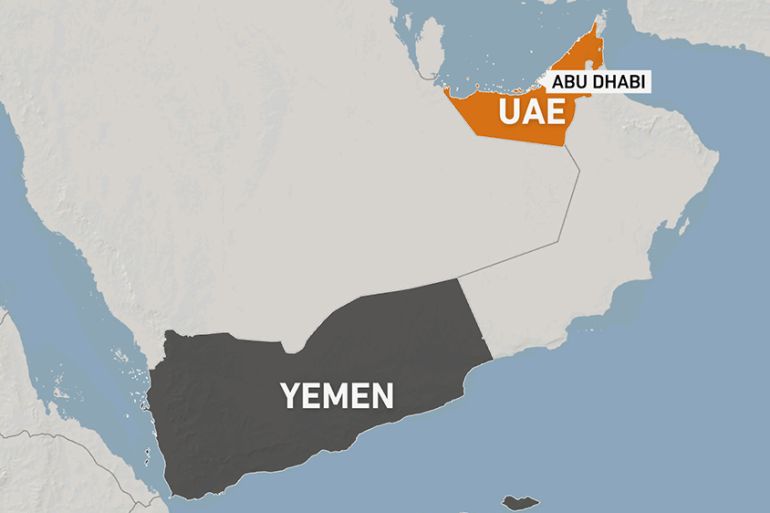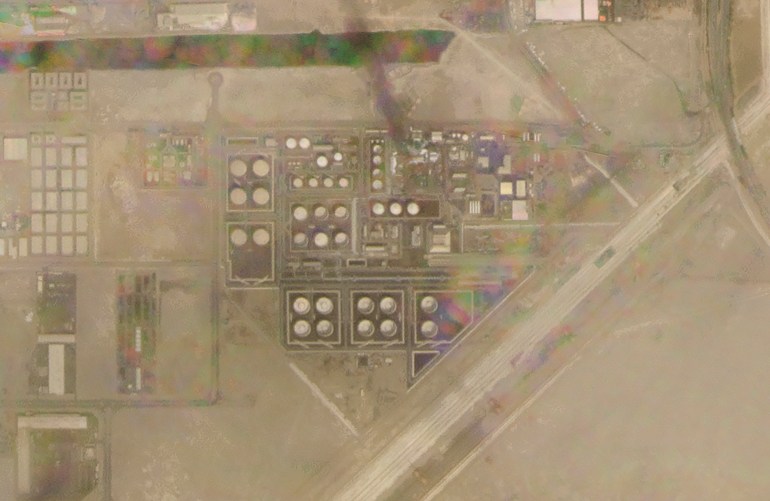UAE says it destroyed three drones with ‘hostile’ intent
Defence ministry says it has intercepted drones in UAE airspace, the fourth incident in three weeks.

The United Arab Emirates (UAE) has intercepted and destroyed three drones that penetrated the Gulf country’s airspace over unpopulated areas, the country’s defence ministry has said.
“MOD (Ministry of Defence) announces interception and destruction, away from populated areas, of three hostile drones that penetrated UAE airspace at dawn today,” the defence ministry said on its official Twitter account late on Wednesday.
Keep reading
list of 4 itemsUAE intercepts Houthi missile as Israeli president visits
Herzog says Israel supports UAE security needs
Rights groups warn Biden against re-blacklisting Yemen’s Houthis
“MOD confirms it is ready to deal with any threats and is taking all necessary measures to protect the state and its territory.”
MOD announces interception and destruction, away from populated areas, of three hostile drones that penetrated UAE airspace at dawn today, 2/2/2022. MOD confirms it is ready to deal with any threats and is taking all necessary measures to protect the state and its territory. pic.twitter.com/xXvbsQByP6
— وزارة الدفاع |MOD UAE (@modgovae) February 2, 2022
The attack has been claimed by a little-known Iraqi group named Awliya al-Waad al-Haq, or The True Promise Brigades, saying it launched “four drones targeting vital facilities in Abu Dhabi” in retaliation for the Emirates’ policies in both Iraq and Yemen.
The group had previously claimed responsibility for an attack on the Yamama Palace in the Saudi capital Riyadh on January 23, 2021.
Both Iraqi and American officials believe the Saudi attack originated from Iraq. This raises the possibility that the UAE is now being targeted from its north and south, after three recent attacks launched by the Iran-backed rebel Houthi group in Yemen.
Iraqi Shia leader Muqtada al-Sadr condemned the attack in a statement, saying that some “terrorist outlaws” have dragged Iraq into a “dangerous regional war” by targeting a “Gulf state”.
Sadr, who published a statement on Twitter, didn’t make it clear if he was referring specifically to a foiled drone attack on the UAE.
The Emirates said it intercepted three drones that entered its airspace over unpopulated areas, in an attack that was claimed by a little known group, the “True Promise Brigade
The Washington Institute for Near-East Policy has suggested The True Promise Brigades has ties to Iraq’s Kataib Hezbollah, or Hezbollah Brigades, an Iran-backed group listed by the US as a terrorist organisation. The group is separate from the Lebanese group of the same name.
Yemen’s Houthis also attributed the attack to the brigade. The war reached Emirati soil for the first-known time last month, when the Houthis fired drones and missiles at the country.
The Gulf state has faced several attacks in the past few weeks including a third missile attack on Monday during a visit by Israel’s president, drawing US intervention.
The US deployed Patriot interceptors to thwart the attacks, according to White House spokesperson Jen Psaki. The Pentagon later said UAE surface-to-air missiles struck down the incoming missile.
Yemen’s Iran-aligned Houthi movement has claimed responsibility for the last three attacks. The group says it will continue to attack the UAE, the region’s commercial and tourism hub, until it stops interfering in Yemen.
The UAE has significantly reduced its military presence in Yemen since 2019, but it still projects power via large local forces that it has built and armed.

The Saudi-led coalition intervened in Yemen in March 2015 after the Houthis ousted the internationally-recognised government from the capital, Sanaa and most of northern Yemen.
The US said on Tuesday it is sending fighter jets to assist the UAE following the missile and drone attacks. The Saudi-led coalition has carried out several airstrikes in Yemen, including on a prison, killing scores of people since the first attack on the UAE last month.
The US State Department urged Americans last month to reconsider travel plans because of the threat of missile or drone strikes. The United Kingdom warned in a travel advisory on Wednesday that “further attacks are very likely”.
While the UAE, which does not directly border Yemen, has not been a major target of attacks by Houthis since 2015 – when it began fighting in Yemen as part of a Saudi-led military coalition – a January 17 attack by the Houthis appeared to signal a distinct strategic shift for the rebel group.
The escalation has raised concerns of a worsening humanitarian crisis in Yemen, where the World Food Programme has warned that more than five million people are on the brink of famine, and 50,000 others are living in famine-like conditions.
Some four million people have been internally displaced during the fighting over the years.